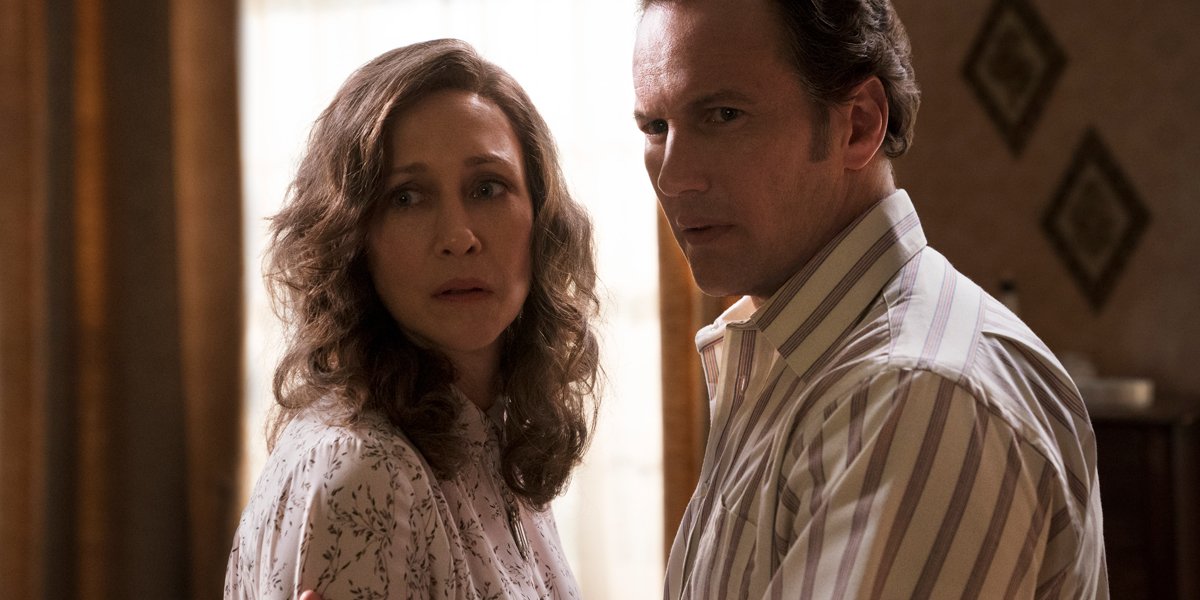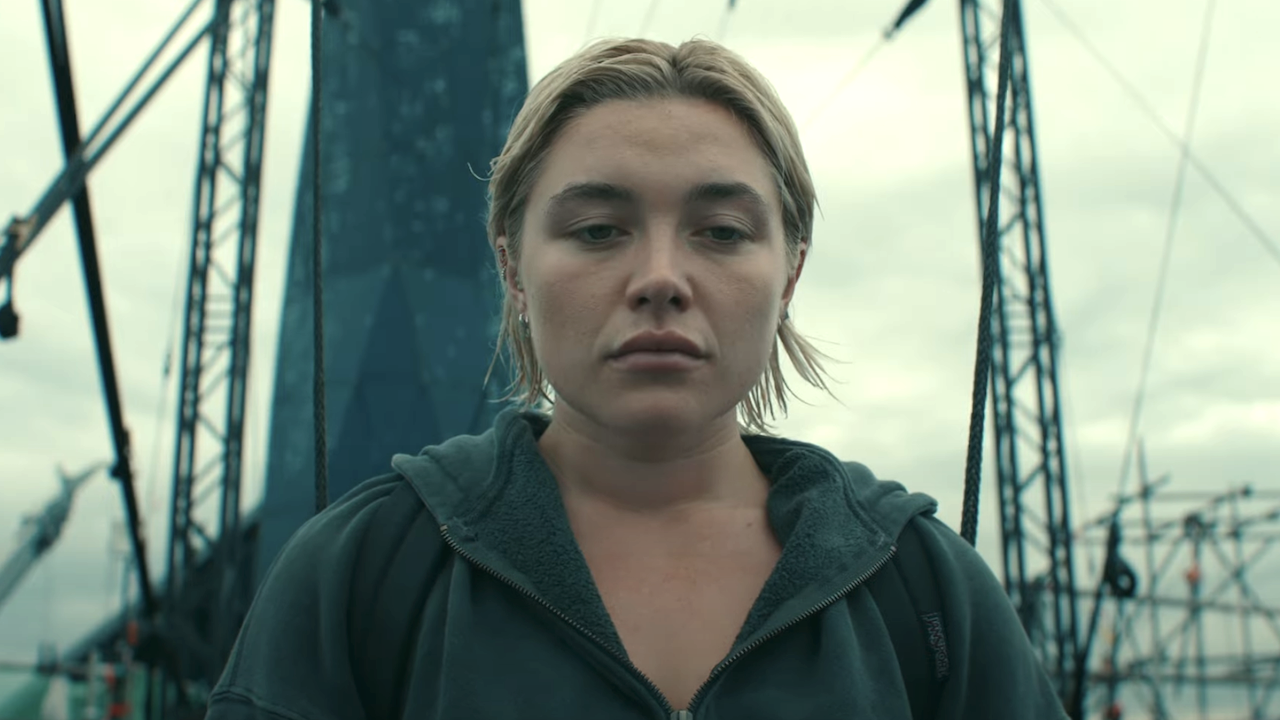The “based on a true story” hook has been a part of the Conjuring movies from the very beginning – with a grain of salt resembling a boulder necessary to be taken with the word “true.” Ed and Lorraine Warren were real people who operated as self-professed demonologists and paranormal investigators, and while the legitimacy of their work is highly questionable, recorded incidents have provided a wonderful foundation and inspiration for some terrifying films.
This has worked as a formula because reality and the truth have proven to be unobtrusive elements. The case files involving the Perron and Hodgson families (the basis for The Conjuring and The Conjuring 2, respectively) were self-contained incidents with claims of hauntings and possessions, and director James Wan simply built on those stories with the dominant idea that demons and pure evil are real. Ultimately there were no greater consequences or wider repercussions that stretched beyond the actual events, and as a result audiences can take the big screen portrayals at face value.
The reality at the heart of The Conjuring: The Devil Made Me Do It does not operate in the same way, though. To the credit of Wan (who is a producer and developed the story), screenwriter David Leslie Johnson-McGoldrick, and director Michael Chaves, the sequel makes a legitimate attempt to try and mix things up in the film series by tackling a different subgenre – namely having the Warrens tracking clues on an investigation instead of in a haunted house – but certain decisions that are made with the narrative prevent it from clicking in the same way as its predecessors. There is still a lot to like, with Patrick Wilson and Vera Farmiga once again proving to be a phenomenal on-screen duo, and the movie providing plenty of big scares, but it also fails to totally hang together as it should.
Set about a half-decade after the events of The Conjuring 2 and bringing the Warrens into the 1980s, The Devil Made Me Do It begins at a point where most of the films in the series climax: an exorcism. The married paranormal investigators have been trying to help David Glatzel (Julian Hilliard), a young boy who has been possessed by a demon, and their work gets approval from the Catholic Church. Things go terribly wrong during the ceremony, however, and Arne Johnson (Ruairi O’Connor), the boyfriend of David’s sister, Debbie (Sarah Catherine Hook), invites the evil spirit to enter his body and leave the innocent child alone. Days later, the demon takes control of Arne and the young man winds up killing his landlord (Ronnie Gene Blevins) – a crime for which he is subsequently arrested when cops find him covered in blood and walking down the street in a daze. The state wants to pursue the death penalty for a first degree murder charge, but the Warrens come to his defense knowing that he isn’t responsible for the crime. They successfully convince Arne’s attorney to plead innocent because of demonic possession, the first ever such defense in the history of the United States court system, but then it becomes the investigators’ job to find evidence to support the claim.
The true story that inspires The Devil Made Me Do It provides hurdles the movie can’t leap.
It’s in that last part that The Conjuring: The Devil Made Me Do It runs into problems. The premise put forward by the plot is that Ed and Lorraine are in a race against time to try and find evidence that can be used in a court of law to exonerate Arne Johnson… but there is no actual aspect of the investigation that can be applied that way. The audience knows that the movie version of Arne is innocent, both because it’s made unequivocal in the first act and because of the rules of the universe established in the canon, but the film totally ignores the legal aspects of the story whenever it’s not in a courthouse or a lawyer’s office, and there is not a single thing unearthed by the Warrens that could be presented to a jury.
Instead of discovering proof of Arne’s demonic possession, the movie instead tries to reframe the question to be “who is responsible for Arne’s demonic possession?” That provides a nice framework to work within, and a mystery that has some solid twists and turns – but that’s because it’s all imagination with no tether to true events or reality. When it comes time to provide some closure for the main narrative, the dovetail with the real world sentencing is a total flub that retroactively hurts the rest of the film because you grasp how unfocused it all is.
It’s great to see the Warrens in a new kind of story, and it’s a fitting choice.
The Conjuring: The Devil Made Me Do It arrives at am underwhelming conclusion, but it is an engaging horror story right up until that disappointment. Having Ed and Lorraine Warren on the hunt for clues regarding a larger conspiracy proves to be refreshing break from the usual context, and a strong use of the characters that tests them in new ways. Most importantly, it still provides plenty of opportunities for disturbing and scary scenes. He has big shoes to fill following the work of James Wan, but Michael Chaves ups his game in a big way from his previous Conjuring Universe entry, The Curse of La Llorona, with some sincerely freaky moments – including a flashback to David’s possession, an intense flashback that Lorraine features first-hand as a result of her psychic gifts, and a sequence while Arne is on suicide watch.
Patrick Wilson and Vera Farmiga are once again spectacular together.
Of course, while the hook of the Conjuring movies is the “based on a true story” gimmick, the real draw is the power pack that is Patrick Wilson and Vera Farmiga together as these characters. They’re effortlessly charismatic and provide a genuine and important verisimilitude – but above all else they are just spectacular as a pair with off-the-charts chemistry. A massive part of why the audience cares about Ed and Lorraine is because of how much they care for each other, and The Devil Made Me Do It is another example proving how compelling they can be.
Among the highs and the lows of this franchise, The Conjuring: The Devil Made Me Do It is a middle-of-the-pack release that doesn’t hit the highs of its direct predecessors, but is considerably better than some of the spin-offs. It’s in many ways a circumstance of reach exceeding grasp, particularly as it dances around the sensitivity required when dealing with a story involving a real murder, but it properly delivers with scares, and features some terrific work from its stars.

Eric Eisenberg is the Assistant Managing Editor at CinemaBlend. After graduating Boston University and earning a bachelor’s degree in journalism, he took a part-time job as a staff writer for CinemaBlend, and after six months was offered the opportunity to move to Los Angeles and take on a newly created West Coast Editor position. Over a decade later, he's continuing to advance his interests and expertise. In addition to conducting filmmaker interviews and contributing to the news and feature content of the site, Eric also oversees the Movie Reviews section, writes the the weekend box office report (published Sundays), and is the site's resident Stephen King expert. He has two King-related columns.
Tommy Boy's Director Recalled Matthew McConaughey's Audition For The Movie And How He Filmed It In A 'Room Filled With Mouse S---'
'What The F--k? Of Course We Are.' Marvel Apparently Was Not So Enthusiastic About Florence Pugh Pulling A Tom Cruise And Jumping Off A Building
People Thought Aimee Lou Wood Was Sobbing Over That SNL Debacle, But She Opened Up About The Incident











